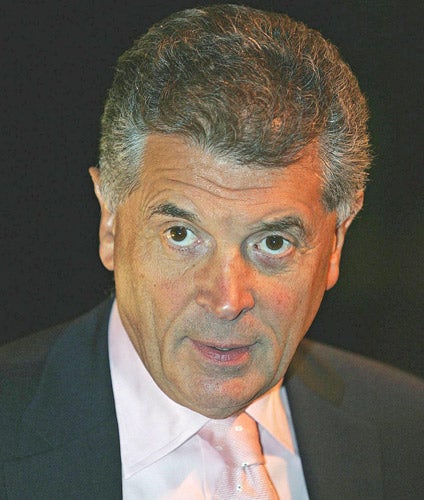FA snubs Dein in favour of Bernstein the businessman
Former Arsenal vice-chairman rejected by old rivals in favour of low-profile choice

David Dein paid heavily for his unpopularity with key figures in English football yesterday when his candidacy for the Football Association chairmanship was rejected in favour of the much lower-profile former Manchester City chairman David Bernstein.
Bernstein's appointment was led by the Bolton Wanderers chairman, Phil Gartside, himself a close friend of Sir Dave Richards, the Premier League chairman. Richards and Dein's enmity is long-standing and, although Richards left the job to the FA's nominations committee, his influence will have been felt throughout the process.
The representatives of the Premier League on the FA board were also keen to appoint a chairman who would not declare war on their organisation – as Lord Triesman did when chairman – and Bernstein fitted that brief.
The FA said yesterday that it was Bernstein's background in business – he has been chairman of Wembley Stadium and worked as a consultant to rescue failing companies – that was the key factor in his appointment. Although experienced in football, Dein does not have the same pedigree in the wider business world.
There was criticism of the FA's decision from former chief executive Mark Palios, who said that the appointment of Bernstein, 67, who left City under a cloud in 2003, was "a safe choice because the people in the game fell out of love with bringing somebody from the outside [after Triesman]".
The television personality Lord Sugar, a former owner of Tottenham Hotspur who was himself improbably suggested for the job at one point, tweeted that Bernstein was "perfect" for the FA because he "never offends anyone, and allegedly never makes a decision".
Although Dein is likely to garner sympathy from some quarters for his failed campaign, there is no likelihood that he would have been any more radical in the job than Bernstein. The decision, which was driven through by Gartside, who is head of the nominations committee, still has to be approved by the FA council on 25 January but that will be a formality.
The cautious nature of Bernstein's earliest public pronouncements yesterday suggested that he is unlikely to promote an agenda of sweeping changes at the 147-year-old FA. He said that it would be "preferable" to have an English manager of the England team beyond the expiration of Fabio Capello's contract in July 2012 and said that there was a "national desire" for that.
The nomination of Bernstein ends Dein's hopes of reviving his career in football after he was forced off the Arsenal board in 2007. His appointment to the 2018 England World Cup bid team as international president – a role specially created for him – presented the former Arsenal vice-chairman with a brief return to the profile he once enjoyed. Given that the bid earned just one foreign vote, it was hard to make the case for him having been a success.
Before he was forced out of Arsenal, Dein was an influential figure in the formation of the breakaway Premier League in 1992 and then as a member of the FA's board. But his unpopularity was made evident in June 2006 when the Premier League clubs, including Gartside and Richards, voted him off the FA main board in favour of David Gill, the Manchester United chief executive.
Gartside described Bernstein yesterday as the "outstanding candidate for the role" and cited his "strong business and leadership skills with tremendous insight and knowledge of football". The FA has sought to emphasise Bernstein's business background – he is on the board of French Connection, Ted Baker and Blacks Leisure – to differentiate him from Dein.
Bernstein was regarded as a prudent City chairman, whose greatest achievement was agreeing the move to the City of Manchester Stadium on favourable rates before he fell victim to boardroom politics and resigned.
However, he has helped to turn around Wembley Stadium to the point that the FA believes it will be able to service its own debts – it cost £757m to build – by 2013 which has alleviated a major concern for the governing body.
It will be telling how the appointment of Bernstein goes down with the Government, which is launching an inquiry into the running of football in the new year, including the potential for reform of the FA. Bernstein hardly qualifies as an independent chairman, as stipulated by the Burns review which, in its recommendations for reform, paved the way for Triesman to get the job two years ago.
Join our commenting forum
Join thought-provoking conversations, follow other Independent readers and see their replies
Comments